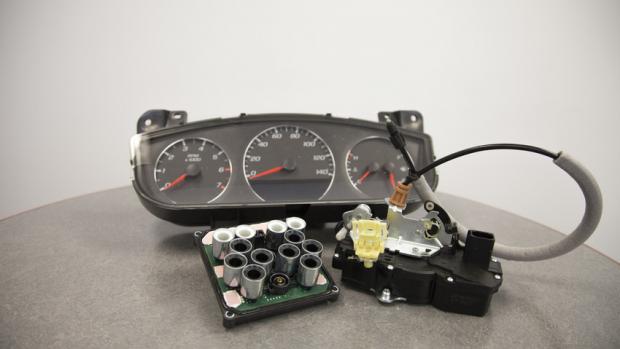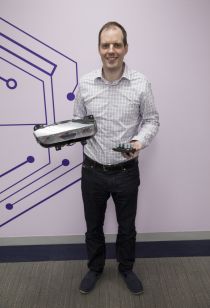Cybersecurity Protocol That Fends Off Automobile Hacks Named to Popular Science Magazine's List of Top 100 Technologies of The Year
Software Protection Developed by Researchers at NYU Tandon School of Engineering, University of Michigan Transportation Research Institute, and Southwest Research Institute

Automotive components that are vulnerable to hackers when automakers or mechanics update their software for recalls or performance modifications.
BROOKLYN, New York – A protocol for protecting automotive software updates from hackers was today named one of the top 100 technologies of the year — the Best of What’s New— by Popular Science magazine. Uptane is an open-source framework that aims to safeguard the more than 100 million lines of code in modern automobiles — code that experience and experiments show is as vulnerable to hacking as the personal data more commonly targeted by cybercriminals.

NYU Tandon Professor Justin Cappos, one of the leaders of the Uptane project, holds two of the automotive components that are vulnerable during software updates.
Uptane evolves the widely used TUF (The Update Framework), developed by NYU Tandon School of Engineering Associate Professor of Computer Science and Engineering Justin Cappos to secure software updates. Uptane is a collaboration of NYU Tandon, the University of Michigan Transportation Research Institute (UMTRI), and the Southwest Research Institute (SwRI), and is supported by contracts from the U.S. Department of Homeland Security, Science and Technology Directorate (DHS S&T).
Much like smartphone device makers, automobile manufacturers rely on remote updates to ensure that a vehicle’s onboard software — which controls everything from airbag deployment to seat belt performance and braking systems — is up to date. However, without proper encryption and verification, those updates are vulnerable to viruses, malware, and ransomware — malicious attacks that may pose catastrophic safety issues. Uptane allows automobile manufacturers to verify the security of third-party software prior to issuing an update and stores the encryption keys for software updates offline.
“As cars become increasingly connected, it’s critical to incorporate the same rigorous security infrastructure that we rely on with other cyber-physical systems such as smart grids, medical devices, and industrial monitoring systems,” said Cappos. “Mounting a widespread vehicle software attack is complex but entirely possible, and now is the time to put the necessary safeguards in place.”
Uptane was chosen among nine technologies in the Security category of the Best of What’s New Awards and is featured in the December issue of Popular Science. “The Best of What’s New Awards honor the innovations that shape the future,” said Joe Brown, editor in chief of Popular Science. “From lifesaving technology to incredible space engineering to gadgets that are just breathtakingly cool, this is the best of what’s new.”
To learn more about Uptane and the Best of What’s New, visit popsci.com.
Note: Images available at dam.engineering.nyu.edu
About the New York University Tandon School of Engineering
The NYU Tandon School of Engineering dates to 1854, the founding date for both the New York University School of Civil Engineering and Architecture and the Brooklyn Collegiate and Polytechnic Institute (widely known as Brooklyn Poly). A January 2014 merger created a comprehensive school of education and research in engineering and applied sciences, rooted in a tradition of invention and entrepreneurship and dedicated to furthering technology in service to society. In addition to its main location in Brooklyn, NYU Tandon collaborates with other schools within NYU, the country’s largest private research university, and is closely connected to engineering programs at NYU Abu Dhabi and NYU Shanghai. It operates Future Labs focused on start-up businesses in downtown Manhattan and Brooklyn and an award-winning online graduate program. For more information, visit engineering.nyu.edu.




